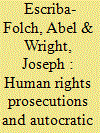| Srl | Item |
| 1 |
ID:
139799


|
|
|
|
|
| Summary/Abstract |
Do human rights prosecutions deter dictatorships from relinquishing power? Advances in the study of human rights show that prosecutions reduce repression in transition countries. However, prosecuting officials for past crimes may jeopardize the prospects of regime change in countries that have not transitioned, namely dictatorships. The creation of the International Criminal Court has further revitalized this debate. This article assesses how human rights prosecutions influence autocratic regime change in neighboring dictatorships. We argue that when dictators and their elite supporters can preserve their interests after a regime transition, human rights prosecutions are less likely to deter them from leaving power. Using personalist dictatorship as a proxy for weak institutional guarantees of posttransition power, the evidence indicates that these regimes are less likely to democratize when their neighbors prosecute human rights abusers. In other dictatorships, however, neighbor prosecutions do not deter regimes from democratizing.
|
|
|
|
|
|
|
|
|
|
|
|
|
|
|
|
| 2 |
ID:
150997


|
|
|
|
|
| Summary/Abstract |
The contentious concept of ‘lawfare’ has proliferated to various foreign policy areas and permeated a discourse on the function and legitimacy of law in conflict. The concept seems particularly apt to the International Criminal Court’s (ICC) judicial interventions. In this context, I define lawfare as the coercive and strategic element of international criminal justice in which the ICC’s judicial interventions are used as a tool of lawfare for States Parties and the United Nations Security Council to pursue political ends. I argue that there are two types of political ends being pursued with this lawfare: conflict resolution and politicized prosecutions. First, the ICC’s spokespersons, advocates, and supporting states have cultivated a discourse that justice is a means to peace. As a result, the ICC has been used as a means of intervention in ongoing conflicts with the expectation that the indictments, arrests, and trials of elite perpetrators have deterrence and preventive effects for atrocity crimes. Despite these legitimate intentions and great expectations, there is little evidence of the efficacy of justice as a means to peace. Second, the other manifestation of lawfare represents an abuse or manipulation of the ICC for political gain. Specifically, States Parties have strategically referred their conflict situations to the ICC with the expectation that the referral will result in the removal of their rivals and sanction the impunity of ruling elites. This politicization of international justice has been successful in that most of the ICC’s prosecutions are unjustly one sided. Evidence of politicized prosecutions has damaged the ICC’s credibility as an impartial institution and raises questions about the desirability of state referrals. Consequently, the ICC’s efficacy and credibility are suffering from lawfare.
|
|
|
|
|
|
|
|
|
|
|
|
|
|
|
|